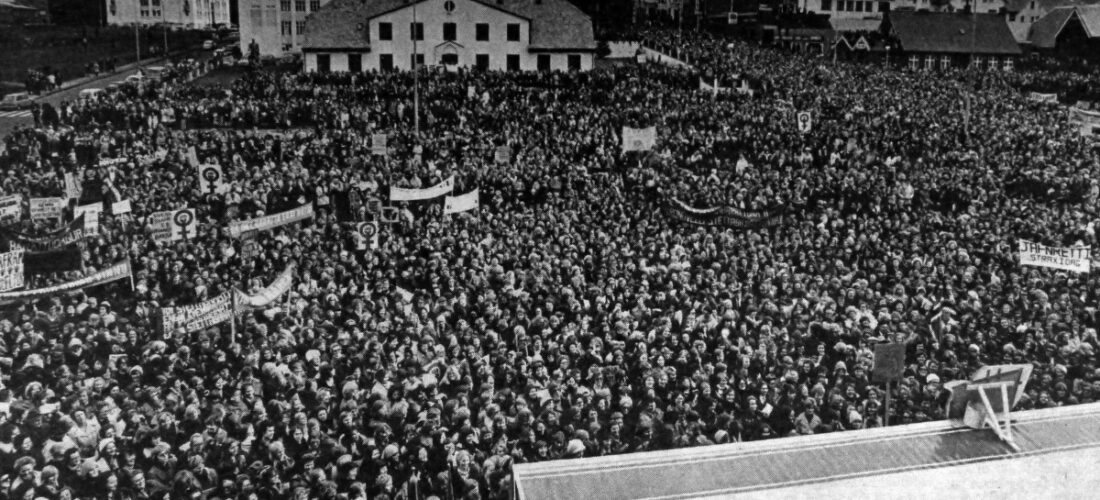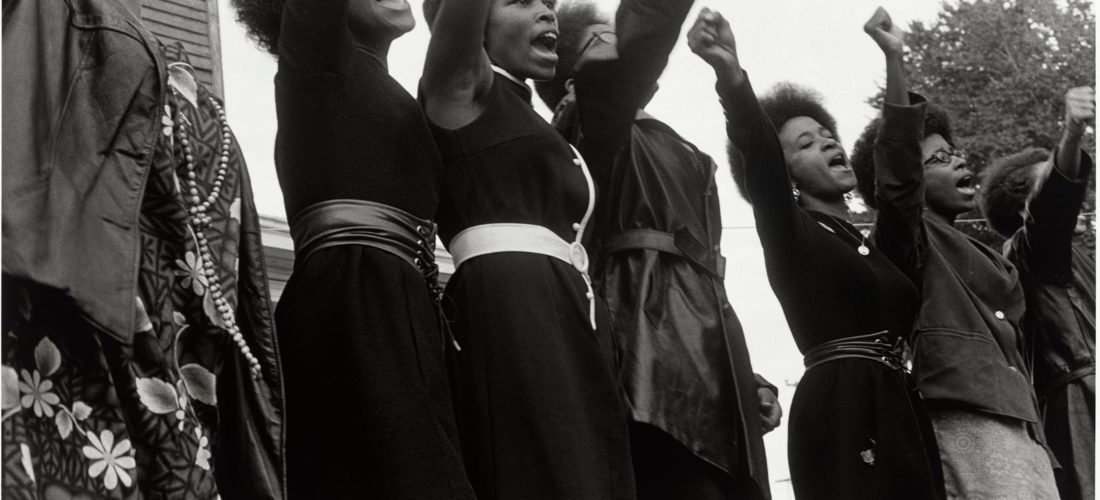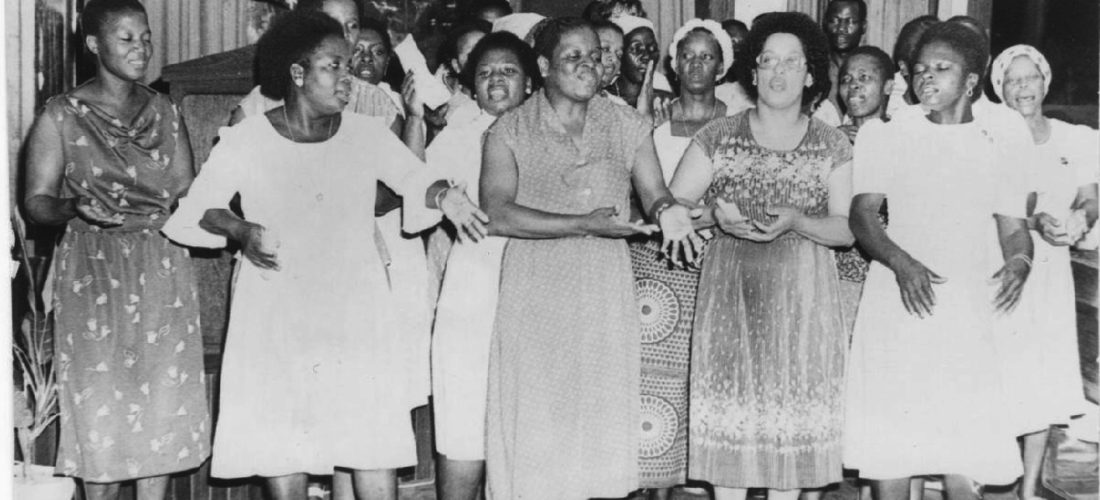On September 7, 1968, a coalition of women’s liberation groups planned various demonstrations against the annual Miss America Pageant in Atlantic City. These demonstrations aimed to challenge the pageant’s objectification of women through beauty standards, its historical exclusion of women of color, and its role as a symbol of militarism and consumerism. Some direct actions discussed in the source included picket lines, guerrilla theater, and a symbolic “Freedom Trash Can” to discard items representing restrictive feminine ideals, culminating in a boycott of pageant-related products and a rally. The source also contains a ten-point protest statement, outlining the group’s grievances against the Miss America pageant and its effects.
women
Women’s Day Off – Executive Committee for Women’s Day Off (1975)
1946-1989, Date, Defining the Enemy, Disruptive Spaces, Patriarchy, Strike, Subjectives of Refusal, Tactics of Disruption, The Home, The Workplace, WomenOn October 24, 1975, ignited by the activism of the Red Stockings radical women’s group, 90% of Iceland’s women went on strike to protest the exploitation of women’s unpaid labor at home and their underpaid, undervalued labor outside the home. The Committee for Women’s Day Off was founded in June 1975 to organize this action. This flyer, issued by the Executive Committee for Women’s Day Off, includes a call to action and outlines the reasons why the strike was essential.

FLARE UP! Niger Delta Women Take on Oil Companies – (2002)
1990-2010, Blockade/Barricade, Date, Defining the Enemy, Disruptive Spaces, Imperialism, Indigenous, Occupation, Privatization, Sabotage/Ecotage, Subjectives of Refusal, Tactics of Disruption, The 'Natural World', The Bourgeoisie, The Workplace, WomenThis article, written by an American journalist under a pseudonym, details the actions taken by indigenous intertribal women of Nigeria against US oil companies ChevronTexaco and Shell. These oil companies, among others, have exploited the oil supply in Nigeria for decades, causing massive environmental degradation and destroying the lands needed for indigenous groups to maintain their livelihoods. Indigenous women of the Urhobo, Itsekiri, Ijaw, Ogoni, and Ilaje tribes united during the summer of 2002 by occupying operational headquarters, barricading the gates, threatening to commit acts of public nudity, as well as seizing control of four oil flow stations. Work was temporarily halted, and the actions taken at the oil flow stations resulted in a ChevronTexaco revenue loss of three million dollars.
“All will not be well for the oil companies in our areas until they start treating us as human beings that deserve a good life.” – IIaje leader B.I. Ugbasanin
The Manukan Declaration (2004)
1990-2010, Date, Disruptive Spaces, Indigenous, Subjectives of Refusal, The 'Natural World', WomenThe Manukan Declaration was signed by seventeen different organizations across North America, South America, Asia, and Africa that make up the Indigenous Women’s Biodiversity Network in 2004. Generally, it advocates for indigenous voices. It highlights the importance of indigenous women in particular to indigenous culture, tradition, and environmental biodiversity.
“As Indigenous women, we have a fundamental role in environmental conservation and preservation throughout the history of our Peoples. We are the guardians of Indigenous knowledge and it is our main responsibility to protect and perpetuate this knowledge. Our weavings, music, songs, costumes, and our knowledge of agriculture, hunting or fishing are all examples of some of our contributions to the world. We are daughters of Mother Earth and to her we are obliged. Our ceremonies recognize her and we return to her the placentas of our children. She also safeguards the remains of our ancestors.”
Gender Violence and the Prison Industrial Complex (2001)
1990-2010, Black, Date, Subjectives of Refusal, WomenThis document was written by Incite!, a group of radical feminists who work to end violence against all women, in 2001. This document makes a connection between state, interpersonal, and domestic violence and strives to address said violence outside of the criminal justice system. It attempts to provides more inclusive and community based solutions in hopes to create violence-free lives for all women.
“It is critical that we develop responses to gender violence that do not depend on a sexist, racist, classist, and homophobic criminal justice system. It is also important that we develop strategies that challenge the criminal justice system and that also provide safety for survivors of sexual and domestic violence. To live violence-free lives, we must develop holistic strategies for addressing violence that speak to the intersection of all forms of oppression.”
The Enemy Within (1970)
1946-1989, Consciousness Raising, Date, Defining the Enemy, Patriarchy, Subjectives of Refusal, Tactics of Disruption, WomenThis document was written by Susan Brownmiller in 1970. She discusses the ways in which women have internalized sexism and patriarchal expectations – for themselves and for other women. She explores this partly through her own personal experiences and observations.
“It was men who made the arbitrary rules of masculine/feminine that we suffer under, but it is women who continue to buy the stereotypes.”
The Feminization of Earth First! (1992)
1990-2010, Date, Subjectives of Refusal, WomenIn this document, Judi Bari describes her experiences as a woman in Earth First!. It explores the relationship between feminism and eco-radicalism – eco-feminism.
“I see no contradiction between deep ecology and eco-feminism. But Earth First! was founded by five men, and its principle spokespeople have all been male. As in all such groups, there have always been competent women doing the real work behind the scenes. But they have been virtually invisible behind the public Earth First! persona of “big man goes into big wilderness to save big trees.” I certainly objected to this.”
“Characteristics of the Early Factory Girls” (1898)
1840-1945, Date, Disruptive Spaces, Subjectives of Refusal, The Workplace, Women, WorkersIn this document, Harriet Hanson Robinson describes women working in factories in the 1830s in Lowell, Massachusetts – from her experience working in a factory starting at 10 years old. The Lowell Factories recruited young women and girls to work in factories. These young women and girls disrupted the workplace, demanding better conditions and wages.
“One of the girls stood on a pump, and gave vent to the feelings of her companions in a neat speech, declaring that it was their duty to resist all attempts at cutting down the wages. This was the first time a woman had spoken in public in Lowell, and the event caused surprise and consternation among her audience.”
Women, Power, and Revolution (1998)
1990-2010, Black, Date, Subjectives of Refusal, WomenThis document by Kathleen Neal Cleaver explores the role of women and gender in the Black Panther Party and Black Power Movement.
“At times, during the question-and-answer session following a speech I’d given, someone would ask, “What is the woman’s role in the Black Panther Party?” I never liked that question. I’d give a short answer: “It’s the same as men.” We are revolutionaries, I’d explain… The assumption held that being part of a revolutionary movement was in conflict with what the questioner had been socialized to believe was appropriate conduct for a woman.”
A Fundamental Necessity of the Revolution (1973)
1946-1989, Colonized, Date, Subjectives of Refusal, WomenThis document is from the opening speech – given by Samora Machel – of the First Conference of Mozambican Women. In this speech, Machel answers the question “why women’s liberation?” She explores the basis of women’s exploitation and oppression, how it is replicated, and why it should be disrupted – especially within the context of a colonial revolution.
“The liberation of women is not an act of charity. It is not the result of a humanitarian or compassionate position. It is a fundamental necessity for the Revolution, a guarantee of its continuity, and a condition for its success.
The Revolution’s main objective is to destroy the system of the exploitation of man by man, the construction of a new society which will free human potentialities and reconcile work and nature. It is within this context that the question of women’s liberation arises.”
S.C.U.M Manifesto (1967)
1946-1989, Date, Defining the Enemy, Patriarchy, Subjectives of Refusal, WomenValerie Solanas’s 1967 publication is a satirical analysis of the problems facing the female gender, and the radical solutions she has to these problems. In her criticism of the patriarchy, Solanas argues for the elimination of the male gender, and establishes men as an “incomplete versions” of women. In light their incompleteness, men spend their lives trying to compensate for their inferiority to women by attempting to live through them. Often noted as one of the most radical texts of the women’s liberation movement, the SCUM Manifesto created space for imagining new and innovative solutions for the oppression of women.










